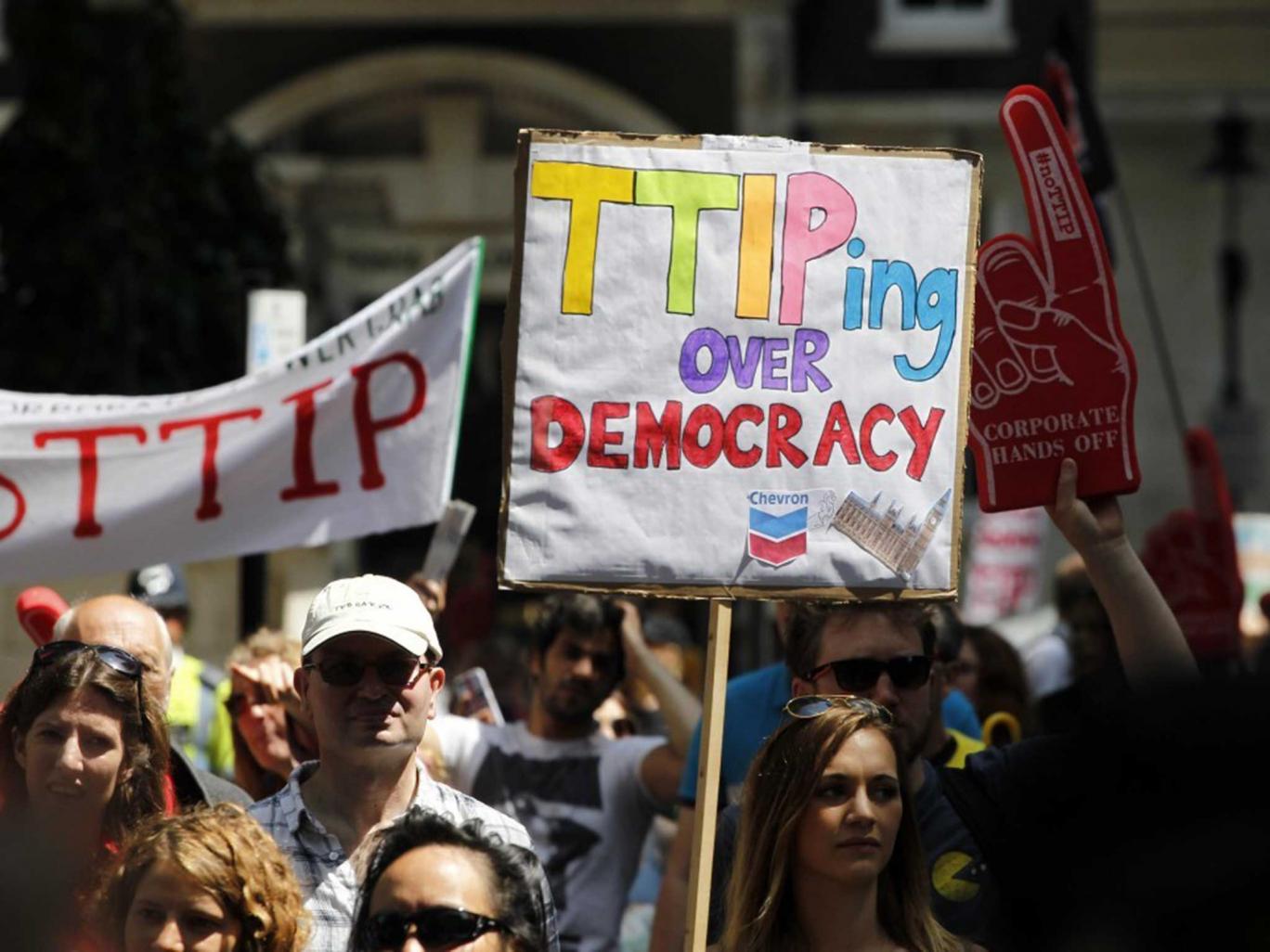
TTIP is short for Transatlantic Trade and Investment Partnership, a bilateral trade agreement between the European Union and the US. TTIP is supposed to regulate and "harmonise" trade between the partners by reducing regulations.
According to supporters, this will lead to a £10bn ($15.5bn) trade increase for the UK. With all member states of the EU and the US included in the deal a total of 820 million people will be affected by the agreement. (source)
The controversial agreement has been criticized and opposed by unions, charities, NGOs and environmentalists, particularly in Europe, with The Independent describing the range of negative impacts as "reducing the regulatory barriers to trade for big business, things like food safety law, environmental legislation, banking regulations and the sovereign powers of individual nations", or more critically as an "assault on European and US societies by transnational corporations". An EU direct democracy mechanism, the European Citizens' Initiative, which enables EU citizens to call directly on the European Commission to propose a legal act, acquired over 3.2 million signatures against TTIP and CETA within a year. (source)
The covert nature of the talks may well be the least of our problems. Here are six other reasons why we should be scared of TTIP, very scared indeed:
1. The NHS
Public services, especially the NHS, are in the firing line. One of the main aims of TTIP is to open up Europe’s public health, education and water services to US companies. This could essentially mean the privatisation of the NHS.
The European Commission has claimed that public services will be kept out of TTIP. However, according to the Huffington Post, the UK Trade Minister Lord Livingston has admitted that talks about the NHS were still on the table.
2. Food and environmental safety
TTIP’s ‘regulatory convergence’ agenda will seek to bring EU standards on food safety and the environment closer to those of the US. But US regulations are much less strict, with 70 per cent of all processed foods sold in US supermarkets now containing genetically modified ingredients. By contrast, the EU allows virtually no GM foods. The US also has far laxer restrictions on the use of pesticides. It also uses growth hormones in its beef which are restricted in Europe due to links to cancer. US farmers have tried to have these restrictions lifted repeatedly in the past through the World Trade Organisation and it is likely that they will use TTIP to do so again.
The same goes for the environment, where the EU’s REACH regulations are far tougher on potentially toxic substances. In Europe a company has to prove a substance is safe before it can be used; in the US the opposite is true: any substance can be used until it is proven unsafe. As an example, the EU currently bans 1,200 substances from use in cosmetics; the US just 12.
3. Banking regulations
TTIP cuts both ways. The UK, under the influence of the all-powerful City of London, is thought to be seeking a loosening of US banking regulations. America’s financial rules are tougher than ours. They were put into place after the financial crisis to directly curb the powers of bankers and avoid a similar crisis happening again. TTIP, it is feared, will remove those restrictions, effectively handing all those powers back to the bankers.
4. Privacy
Remember ACTA (the Anti-Counterfeiting Trade Agreement)? It was thrown out by a massive majority in the European Parliament in 2012 after a huge public backlash against what was rightly seen as an attack on individual privacy where internet service providers would be required to monitor people’s online activity. Well, it’s feared that TTIP could be bringing back ACTA’s central elements, proving that if the democratic approach doesn’t work, there’s always the back door. An easing of data privacy laws and a restriction of public access to pharmaceutical companies’ clinical trials are also thought to be on the cards.
5. Jobs
The EU has admitted that TTIP will probably cause unemployment as jobs switch to the US, where labour standards and trade union rights are lower. It has even advised EU members to draw on European support funds to compensate for the expected unemployment.
Examples from other similar bi-lateral trade agreements around the world support the case for job losses. The North American Free Trade Agreement (NAFTA) between the US, Canada and Mexico caused the loss of one million US jobs over 12 years, instead of the hundreds of thousands of extra that were promised.
6. Democracy
TTIP’s biggest threat to society is its inherent assault on democracy. One of the main aims of TTIP is the introduction of Investor-State Dispute Settlements (ISDS), which allow companies to sue governments if those governments’ policies cause a loss of profits. In effect it means unelected transnational corporations can dictate the policies of democratically elected governments.
ISDSs are already in place in other bi-lateral trade agreements around the world and have led to such injustices as in Germany where Swedish energy company Vattenfall is suing the German government for billions of dollars over its decision to phase out nuclear power plants in the wake of the Fukushima disaster in Japan. Here we see a public health policy put into place by a democratically elected government being threatened by an energy giant because of a potential loss of profit. Nothing could be more cynically anti-democratic.
There are around 500 similar cases of businesses versus nations going on around the world at the moment and they are all taking place before ‘arbitration tribunals’ made up of corporate lawyers appointed on an ad hoc basis, which according to War on Want’s John Hilary, are “little more than kangaroo courts” with “a vested interest in ruling in favour of business.”









+is+just+about+to+shoot+a+Jewish+man+kneeling.jpg)



COMMENTS